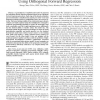Free Online Productivity Tools
i2Speak
i2Symbol
i2OCR
iTex2Img
iWeb2Print
iWeb2Shot
i2Type
iPdf2Split
iPdf2Merge
i2Bopomofo
i2Arabic
i2Style
i2Image
i2PDF
iLatex2Rtf
Sci2ools
119
click to vote
TSMC
2010
2010
Probability Density Estimation With Tunable Kernels Using Orthogonal Forward Regression
A generalized or tunable-kernel model is proposed for probability density function estimation based on an orthogonal forward regression procedure. Each stage of the density estimation process determines a tunable kernel, namely, its center vector and diagonal covariance matrix, by minimizing a leave-one-out test criterion. The kernel mixing weights of the constructed sparse density estimate are finally updated using the multiplicative nonnegative quadratic programming algorithm to ensure the nonnegative and unity constraints, and this weight-updating process additionally has the desired ability to further reduce the model size. The proposed tunable-kernel model has advantages, in terms of model generalization capability and model sparsity, over the standard fixed-kernel model that restricts kernel centers to the training data points and employs a single common kernel variance for every kernel. On the other hand, it does not optimize all the model parameters together and thus avoids the...
Related Content
| Added | 22 May 2011 |
| Updated | 22 May 2011 |
| Type | Journal |
| Year | 2010 |
| Where | TSMC |
| Authors | Sheng Chen, Xia Hong, Chris J. Harris |
Comments (0)

